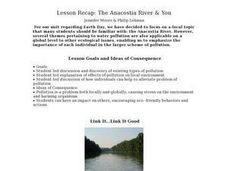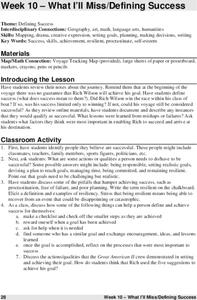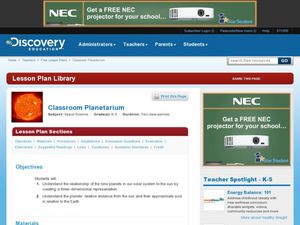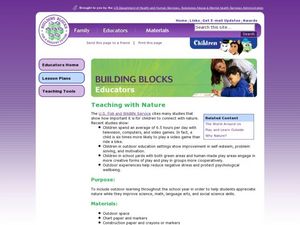The New York Times
Stress Less: Understanding How Your Mind and Body Respond to Anxiety
What could be more relevant to teens and preteens than experiencing stress? Use an article from the New York Times website to practice valuable Common Core skills for informational text reading, and also get a discussion going in your...
Curated OER
Holidays: Stress on the Body
Students read an article on stress and holiday weight gain. In this biology lesson plan, students research about the body's response to excess sugar in the diet. They create a pamphlet, billboard, newscast or journal article containing...
Baylor College
HIV/AIDS in the United States
In the final of five lessons about HIV/AIDS, groups create presentations to share data about the infection rates in the United States, examining demographic and geographic trends over the past ten years. Depending on how much time you...
Curated OER
Introduce a Weather Unit
Engage your learners by playing Water Music Suite by Handel. Different types of weather sounds play on the recording, and it's an easy lead into talking about the weather! What is weather? What kinds of weather exist? What is it called...
Curated OER
High Anxiety
The Learning Network section of the New York Times produces high-quality teaching materials. This issue gets middle or high schoolers reading an article about how people use art to express their response to high-stress events. They work...
Curated OER
Poetry Pop-Up
Third graders, after exploring the process of writing poetry through imagery words that go beyond pen and paper, create a Poetry Pop-Up Book. They incorporate the use of the Thesaurus and clip-art/digital photography to assist them in...
Curated OER
Strong as the Weakest Link
Pupils discover the types of stress that materials undergo. They examine how bridges and skyscrapers are built to withhold the tension. They create their own structure out of marshmallows and spaghetti.
Curated OER
Lesson Recap: The Anacostia River & You - Biology Teaching Thesis
Seventh graders give examples of local sources of pollution and postulate reasons as to why local sources of pollution can harm the ecosystem. They address the following question in short answer form: "Why is litter/chemical pollution...
Curated OER
Combining with Participial Phrases
Combine participial phrases and creative writing with this lesson, which is equally helpful for writing skills and conventions. After a mini-lesson on participial phrases and reading the picture book Dancing in the Wings, pupils use a...
Practical Money Skills
Making Money
The first step in managing your money is making money! Learn about ways to find and interview for a job with a thorough instructional activity on personal finances. Kids learn about the ways to earn a paycheck and then manage the funds...
Curated OER
Defining Success
The class defines what it means to be successful by examining the achievements of Rich Wilson. They create headlines for a mock paper, discuss achieving personal goals, and create a scrapbook of his journey. Tip: Use this resource when...
Curated OER
Ch-Ch-Ching Cafe: Play Restaurant Make Change
Fourth graders make change by participating in a role-play restaurant activity. In this making change lesson, 4th graders use their math skills to compare prices and compute bills in a role play restaurant activity.
Curated OER
Strong Vibes
Students consider how the tension of a rubber band relates to the stress build-up in earthquakes. They conduct research and write fictional television coverage about a Pacific Northwest town that is hit by an earthquake.
Curated OER
Classroom Planetarium
Students work in groups to create the planets of the solar system. In this planets lesson, students create a hanging solar system taking into account the size, shape and position of the planets. Students discuss the gravity...
Curated OER
Men, Women, and Careers
Teach young learners that they can have any job they want, no matter their gender! An elementary activity emphasizes that while some jobs may be more closely associated with men or with women, people of either gender can complete...
Curated OER
Plant Hormones
Students identify different plant hormones and explain their function in plant development. In this biology lesson, students investigate how IAA affect root growth. They study the history of auxin discovery.
Curated OER
Hattie and the Fox
Who is Hattie? Youngsters explore animal characteristics by reading poems and stories in class. They read the book Hattie and the Fox about a fictitious fox and his drama with the other farm animals. Then they reread the story over...
Curated OER
Physics E3 Project Instructional Plan
Eleventh graders explore Hooke's law through a variety of hands on activities. In this physics lesson plan, 11th graders perform a computer simulation on Hooke's law. They design a mechanism to test the stress and strain of certain...
Curated OER
Self Advocacy
Students develop the skills necessary to advocate for themselves through adulthood. Through class discussion and creative projects, students create a portrait of themselves as adults. They develop an action plan for their adult years and...
Curated OER
Accenting the Negative Space in Ceramics
Fourth graders apply knowledge of the elements of design and hand building techniques in clay to illustrate the concept of negative space by cutting shapes out of the form to create an intricate pattern.
Curated OER
Teaching with Nature
Students participate in a nature walk to learn about their natural environments. For this nature study lesson, students brainstorm a list of things to look for on their nature walk. Students go on the nature walk and locate objects they...
Curated OER
Slavery and the Underground Railroad
Fourth graders study slavery escape routes of the Underground Railroad on maps, read an account of an escape and then write narrative essays about a fictional slave's escape.
Curated OER
SOS!
Learners examine natural and man-made threats to sea turtles. They create sea turtle mobiles while studying the range, environment, predators of and threats to sea turtles.
Curated OER
Stop, Look and Listen
Students study and observe city wildlife and their local community's wildlife. In this wildlife activity, students look for animal clues in their local places. Students observe animals using cameras and journals. Students make a...

























